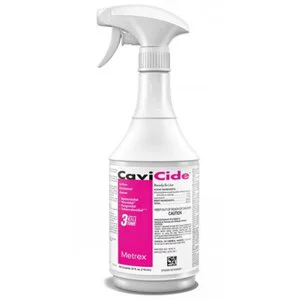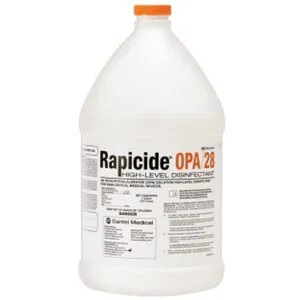Filter Products
Filter Products
Disinfectant Solutions
As low as
$59.30How do disinfectant solutions for dental use work?
Disinfectant solutions for dental use typically work by killing or inactivating microorganisms, such as bacteria and viruses, on surfaces and instruments in the dental office. Most disinfectant solutions contain active ingredients such as quaternary ammonium compounds, chlorine compounds, or hydrogen peroxide, which are effective against a wide range of microorganisms. Some popular disinfectant solutions used in dental offices include CaviCide, Sporox II, ProCide-D, and BioSURF.
What is the recommended concentration of disinfectant solution for dental use?
The recommended concentration of disinfectant solution for dental use varies depending on the specific product and the intended use. Generally, disinfectant solutions should be used at the concentration recommended by the manufacturer and should be diluted or mixed according to the instructions on the label. To ensure the disinfectant solution is both safe and effective for use, it's crucial to carefully follow the instructions provided. It's important to note that there may be variations in the instructions depending on the dental specialty, so it's recommended to verify the specific guidelines for each specialty.
What is the recommended contact time for disinfectant solutions for dental use?
The recommended contact time for disinfectant solutions for dental use also varies depending on the product and the intended use. In general, disinfectant solutions should be allowed to remain in contact with the surface or instrument for a sufficient amount of time to ensure that all microorganisms have been killed or inactivated. The time required may vary between a few seconds and several minutes, depending on the product.
What are the safety precautions to take when using disinfectant solutions for dental use?
When using disinfectant solutions for dental use, it is important to take appropriate safety precautions to protect yourself and others from exposure to the product. This may include wearing personal protective equipment, such as gloves and goggles, ensuring proper ventilation in the workspace, and following the instructions on the label carefully. It is also important to properly store and dispose of the product according to local regulations.
Can disinfectant solutions for dental use damage equipment or surfaces?
Disinfectant solutions for dental use can potentially damage certain types of equipment or surfaces if not used properly. For example, some disinfectants may be corrosive to certain metals or plastics or may cause discoloration or damage to certain types of furniture or flooring. To ensure that the disinfectant is safe for use on the intended surfaces or instruments, it is important to carefully read and follow the instructions on the label. Additionally, you may also want to check with the equipment manufacturer to confirm compatibility.
























